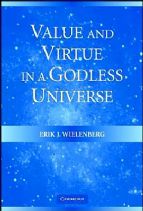Creeds to Live By
There is an idea that Wielenberg discusses which is often brought up in discussions of naturalism & Christianity. It is that "we should try to inculcate certain beliefs about the supernatural on the grounds that widespread acceptance of those beliefs will make us better of in general." I think that this idea is clearly nonsense, but will at least summarize what wielenberg says about the matter. His response to this argument is: "Certain views in the Old Testament are very dangerous, and the less widely these views are held the better off we are." The following are "dangerous elements" in the OT:
- "There is a God who has selected a particular group of people to be his chosen people"
- "There is a God whose commands trump all other considerations"
- "There is a God who sometimes commands invasion, killing, and genocide--sometimes when there is no apparent justification other than that they have been commanded by God"
- "Some people have the authority to order such activities on God's behalf."
"United with his fellow-men by the strongest of all ties, the tie of a common doom, the free man finds that a new vision is with him always, shedding over every daily task the light of love. The life of Man is a long march through the night, surrounded by invisible forces, tortured by weariness and pain, towards a goal that few can hope to reach, and where none may tarry long. One by one, as they march, our comrades vanish from our sight, seized by the silent orders of omnipotent Death. Very brief is the time in which we can help them, in which their happiness or misery is decided. Be it ours to shed sunshine on their path, to lighten their sorrows by the balm of sympathy, to give them the pure joy of a never-tiring affection, to strengthen failing courage, to instil faith in hours of despair. Let us not weigh in grudging scales their merits and demerits, but let us think only of their need -- of the sorrows, the difficulties, perhaps the blindnesses, that make the misery of their lives; let us remember that they are fellow-sufferers in the same darkness, actors in the same tragedy with ourselves. And so, when their day is over, when their good and their evil have become eternal by the immortality of the past, be it ours to feel that, where they suffered, where they failed, no deed of ours was the cause; but wherever a spark of the divine fire kindled in their hearts, we were ready with encouragement, with sympathy, with brave words in which high courage glowed."
Although Wielenberg continues to discuss other issues, I will not summarize the rest of this book. This is because the objections which he discusses are not very interesting, and I just discovered a useful synopsis of this book which renders my project of summarizing the book completely pointless.
At any rate this concludes my discussion of the book Value and Virtue in a Godless Universe. Since Wielenberg has established that a naturalist can live a meaningful and moral life without God all that is left is for the naturalist to go out and do so!

No comments:
Post a Comment